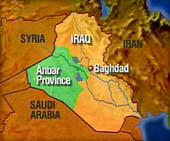In a commentary about the situation in Iraq today, WPR contributor Charles Crain offers a very bleak assessment of the situation in Iraq’s Anbar province, in the far West of the country. Crain says the province would likely become a haven for terrorists if the U.S. quits Iraq:

First, though, they might fight each other for control of the means of violence in Anbar Province. The departure of the Americans won’t necessarily mean the triumph of the jihadists. They have clashed often with the nationalists and probably aren’t a majority within the insurgency.
One thing is certain, though: The insurgents won’t have to waste much time fighting the Iraqi government in Anbar. That government has not been able to establish credible police departments or military units even with substantial American support. Even with the U.S. Marines in the city, the government offices in Ramadi, the provincial capital, are under siege and virtually inoperable. If the Americans left the hollow “government” of Anbar would likely disappear.
At worst, from the American point of view, that would make Anbar a training ground and sanctuary for international Islamic terrorism. At best, from the American point of view, it would make Anbar the solid Sunni heartland in Iraq’s escalating sectarian war.
Crain’s grim view is supported by an August Marine Corps report, the contents of which were reported today in the Washington Post. Although the existence of the report had been reported as early as September, today’s Post story, by Dafna Linzer and Thomas Ricks, details its contents for the first time:
The Marines recently filed an updated version of that assessment that stood by its conclusions and stated that, as of mid-November, the problems in troubled Anbar province have not improved, a senior U.S. intelligence official said yesterday. “The fundamental questions of lack of control, growth of the insurgency and criminality” remain the same, the official said.
. . .
Between al-Qaeda’s violence, Iran’s influence and an expected U.S. drawdown, “the social and political situation has deteriorated to a point” that U.S. and Iraqi troops “are no longer capable of militarily defeating the insurgency in al-Anbar,” the assessment found. In Anbar province alone, at least 90 U.S. troops have died since Sept. 1.
Another line in the Post story sheds light on an under-reported aspect of the Iraq situation: How insurgents are funded. “The report notes that illicit oil trading is providing millions of dollars to al-Qaeda while ‘official profits appear to feed Shiite cronyism in Baghdad.'”
This picture of insurgent funding jibes with that painted by another government report that was leaked to the New York Times Sunday:
The report, obtained by The New York Times, estimates that groups responsible for many insurgent and terrorist attacks are raising $70 million to $200 million a year from illegal activities. It says $25 million to $100 million of that comes from oil smuggling and other criminal activity involving the state-owned oil industry, aided by “corrupt and complicit” Iraqi officials.
Not a pretty picture. Given these facts, Crain’s call for honesty about the consequences of U.S. withdrawal is all the more urgent. He concludes:
But the United States has already gone to war rashly, without making an honest assessment of what lay ahead. If the United States chooses to leave Iraq after presiding over that country’s destruction we should make an effort at honesty. We should acknowledge our failure, and the likelihood of catastrophe, rather than disguising retreat as a new strategy for some kind of limited victory.
